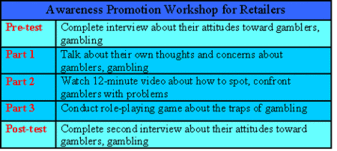Programs aimed at reducing problem gambling can range from treatment facilities for those already suffering from gambling problems to population oriented interventions that include advertising and public service campaigns. Most of these programs rely upon the gamblers’ initiative to seek help or help themselves. An innovative program in Quebec provides awareness promotion workshops for gambling retailers. In this week’s WAGER, we discuss the results of a study that monitored retailers’ impressions of gambling problems before and after one of those workshops (Ladouceur et al., 2004).
Ladouceur et al. (2004) studied a sample of 707 Video Lottery Terminal (VTL) retailers (28.5% women, 71.5% men) from different parts of Quebec who participated in the 2-hour gambling problem workshop. Workshop attendance was mandatory for anyone “in the business” of VLT in Quebec; this particular sample included 76.2% business owners or partners, and 23.8% employees. As part of the workshop, participants: (1) described their thoughts and concerns about people who gamble to excess; (2) watched a 12-minute video about gambling problems (e.g., how to identify them, how to intervene with gamblers, and risks associated with VLTs); and (3) participated in a role play about how some gambling problems develop. Researchers interviewed participants about their attitudes and behaviors toward gamblers (e.g., their understanding of excessive gambling and their willingness to intervene with those with gambling problems) before and after the workshop. They also mailed questionnaires to a randomly selected 496 of the original participants and 504 new retailers who had not attended the workshop 6 months later. Table 1 summarizes the project activities. The analyses compared beliefs pre-workshop and post-workshop; in addition, the results provided evidence about the reported behaviors of workshop participants and control group members at the 6 month follow-up.
Table 1: Program Schedule for the Awareness Promotion Workshop for Retailers of Video Lottery Terminals

A comparison of participants’ answers before and after the session showed that, after the session, participants understood the characteristics of problem gamblers (t(655) = -14.68, p < .001) and the best way to handle such a person (t(650) = -24.82, p < .001) better than before. More workshop participants reported that they were convinced of the importance of gaining knowledge about gambling problems (X2(16) = 476.6, p < .001). At six month follow-up, retailers who had attended the workshop reported intervening with a problem gambler more often (t = 2.11, p< .05) and encouraging irrational gambling behavior (i.e., switching machines when one isn’t paying well) less often (t = 4.09, p < .001) than retailers who had not attended the lecture.
For VLT retailers, this study revealed three apparent post-workshop changes: (1) favorable shifts in attitudes about the need for knowledge of gambling problems; (2) an increased understanding of these problems, and (3) increased behavior intervening with problem gamblers after workshop attendance. However, the fact that the workshop was mandatory might have influenced participants to respond in a socially desirable way. Additionally, the participants gave their post-workshop answers immediately after attending the two-hour session; follow-up data establishing that participants retained knowledge that they learned in the workshop 6-months earlier would strengthen a case for promoting similar workshops for retailers. Unfortunately, in this paper the authors did not compare these questions at the six month follow-up. Finally, although they identified important differences between these groups at follow-up, they did not provide any evidence that these groups did not differ prior to the workshop.
Despite its limitations, this study demonstrates a novel way of preventing gambling problems at the VLT retailers (i.e., point of sale). Future research could measure exactly how these types of workshops might affect the behavior of other non-VLT gambling retailers; for example, future research might include a sample of retailers for whom the workshop was not mandatory. It might also compare perceptions AND behaviors of retailers to a control group, before and after attending the workshop. The research of Ladouceur et al suggests that retailers can benefit from gambling education; future research can determine whether this method can be successful for preventing gambling problems in a wider range of gambling venues.
Comments on this article can be addressed to Michael Stanton.
References
Ladouceur, R., Boutin, C., Doucet, C., Dumont, M., Provencher, M., Giroux, I., Boucher, C. (2004). Awareness promotion about excessive gambling among video lottery retailers. Journal of Gambling Studies, 20(2), 181-185.




